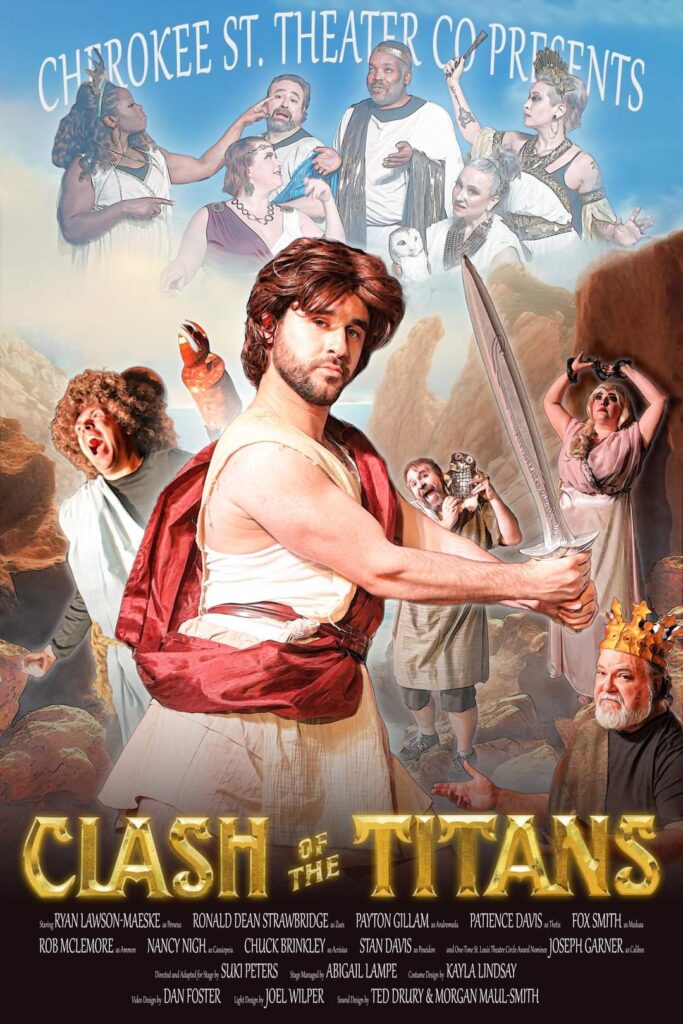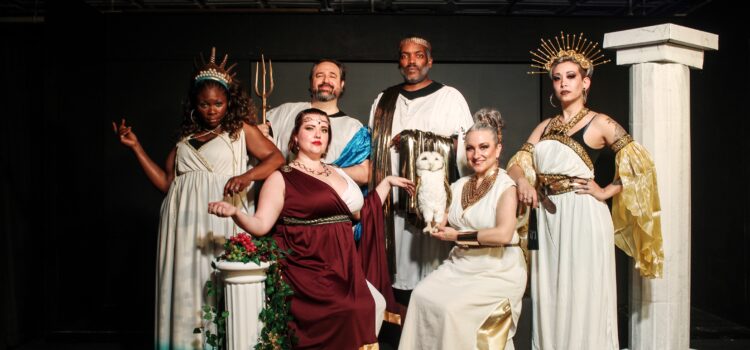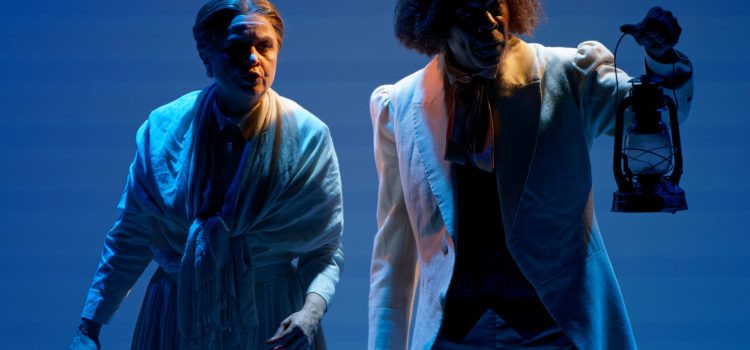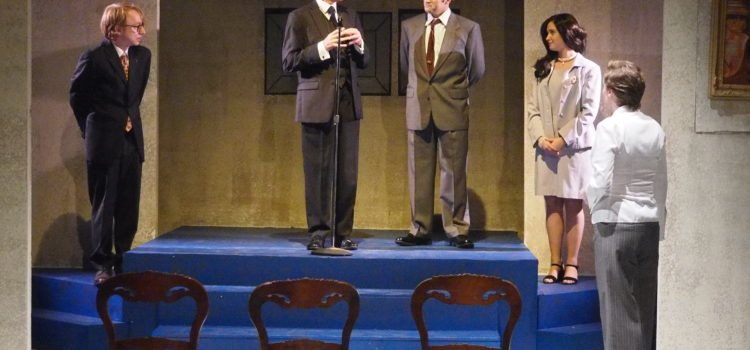By Lynn Venhaus
Funny and fast-paced, “The Clash of the Titans Live Parody” showcases an obliging cast goofing off as famous Greek mythology characters, from Zeus to the Kraken. This is not your high school literature teacher’s reference guide.
The good-natured production is full-throttle silliness, crafted by the Cherokee Street Theatre Company’s brain trust, and they have the skills and collaborative spirit of an improv troupe.
The performers focus on the absurdity while trying not to break character, but hey, it happens. Using the framework mainly of the 1981 film and not the 2010 remake, they lean into the cheesiest elements of the pseudo-prestige epic that starred Laurence Olivier as Zeus, a young and virile Harry Hamlin as Perseus. Ursula Andress had one line as Aphrodite. (The reboot starred Liam Neeson as Zeus and Sam Worthington as Perseus).
The short version is that Perseus must prove his worth to his daddy, foil his stepmom, complete heroic tests, and battle Medusa and the Kraken all to save the lovely Princess Andromeda from a terrible fate.
For those wanting to refresh their Greek Gods and Heroes backstory, Perseus, the favored son of the god Zeus, has not only angered the sea goddess Thetis, but also fallen in love with Princess Andromeda. She had been engaged to Thetis’ son, Calibos. As Perseus goes on one quest after another, people come to a watery demise or are stabbed, or involved in other mayhem.
The adventure movie’s claim to fame is that it was the last film produced by Ray Harryhausen, the legendary special effects creator who was known for stop-motion animation. His Kraken did not disappoint!
One of the pluses about the company moving to Westport Playhouse for the last leg of their run is that they benefit from its large LED screen and are able to show panoramic scenes from the film that help visualize this odyssey – especially when the Kraken is released.
When that happens, the cast takes a moment to splash audience members with water, which is like a few raindrops falling on your head.
Because this company often uses the same repertory of players, the ensemble is a cheerful tight-knit bunch who wrings every possible laugh from these epic characters.
Ronald Dean Strawbridge goes for the gusto as imposing Zeus, while Ryan Lawson-Maeske shows off his acrobatic moves as the swaggering Perseus. Fox Smith has fun as both Hera and Medusa, complete with a daffy snake headtopper.
Patience Davis exaggerates Thetis as only Dame Maggie Smith could and Payton Gillam adds merriment as the sweet love interest Princess Andromeda and a sultry Aphrodite.
Perhaps the most playful in this madcap romp is Joseph Garner, feisty as Calibos and frisky as Bubo, no action too broad.
Supporting players include Nancy Nigh as Athena and Cassiopeia, Rob McLemore as Ammon, Stan Davis as Poseidon and Thallo, and Chuck Brinkley as King Acrisius and Hades.
Even you don’t remember the gods’ playlist or saw either movie, it does not matter. This is just all in good fun, and a terrific escape to watch some skilled performers clown around.
Company founder Suki Peters directed with a light touch and adapted the film to the stage with jokes in mind.
The technical elements are all first-rate, with Joel Wilper’s lighting design and Ted Drury and Morgan Maul-Smith’s sound design enhancing the Westport Playhouse production. The choice of pop-rock hits add to the high spirits.
Video designer Dan Foster seamlessly integrated the film footage to expand our vistas, and it really adds a pleasant viewpoint.
Costume Coordinator Kayla Lindsay celebrated the ancient period, accessorizing many riffs on togas to emphasize the parody. Stan Davis’s props were one of the highlights, adding to the ‘anything goes’ spirit.
Performances take place through June 1 Upstairs at The Golden Record, 2720 Cherokee, and June 9 through 17 at the Playhouse at Westport Plaza. For more information: www.cherokeestreettheatercompany.com.
For June 16 and 17 performances, use promo code “kraken” to save $10 per ticket.

Photo by Anastasiya Vasyuta and show poster by Stan Davis

Lynn (Zipfel) Venhaus has had a continuous byline in St. Louis metro region publications since 1978. She writes features and news for Belleville News-Democrat and contributes to St. Louis magazine and other publications.
She is a Rotten Tomatoes-approved film critic, currently reviews films for Webster-Kirkwood Times and KTRS Radio, covers entertainment for PopLifeSTL.com and co-hosts podcast PopLifeSTL.com…Presents.
She is a member of Critics Choice Association, where she serves on the women’s and marketing committees; Alliance of Women Film Journalists; and on the board of the St. Louis Film Critics Association. She is a founding and board member of the St. Louis Theater Circle.
She is retired from teaching journalism/media as an adjunct college instructor.



